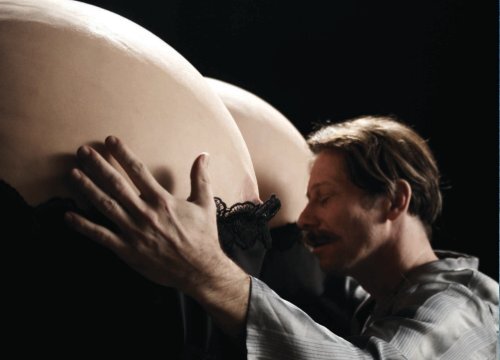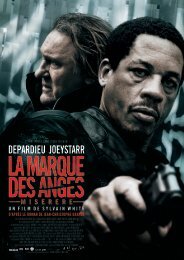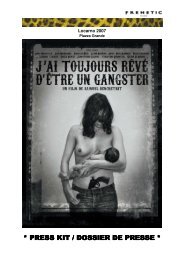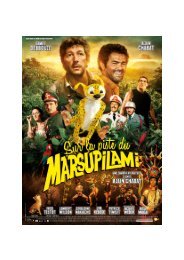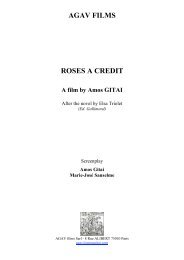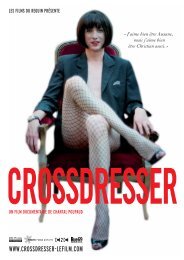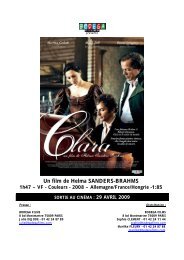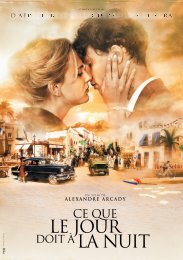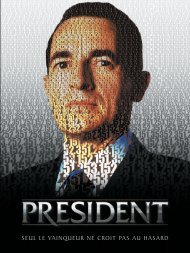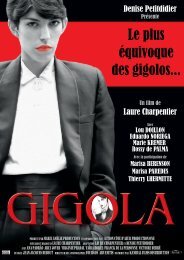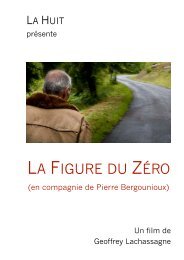Chicken With Plums - Unifrance
Chicken With Plums - Unifrance
Chicken With Plums - Unifrance
Create successful ePaper yourself
Turn your PDF publications into a flip-book with our unique Google optimized e-Paper software.
Interview with Marjane Satrapi<br />
Was it an easy choice for you, after Persepolis, not to make another animated film?<br />
Yes. The most interesting thing in any artistic project is rising to a challenge and doing things you’re yet to do and don’t know how to do. We made an animated film, we<br />
learned a lot, it was long and taxing, even if, of course, we took enormous pleasure from it. It was exciting to do something new. Vincent and I work like that; it’s our engine,<br />
our driving force.<br />
At the same time, Persepolis was an animated film with the intensity, depth and emotion of a “normal” film, while <strong>Chicken</strong> with <strong>Plums</strong>, which is a movie with actors<br />
and real images (well, in the most part!) has all the fantasy, invention and freedom of an animated film.<br />
From the very outset, <strong>Chicken</strong> with <strong>Plums</strong> was a logical, coherent follow-on from Persepolis for us. One, because the movie’s protagonist, this musician broken by love, is the<br />
brother of my grandfather, the revolutionary communist prisoner I spoke of in Persepolis. Here, we rediscover the jasmine flowers that floated in Persepolis, and the movie<br />
theatre in Teheran is called Persepolis... Two, because neither Vincent nor I can forget the medium we come from. We are illustrators, so there are obviously certain things that<br />
it’s normal for us to use – although without setting out to turn them into a demonstration or manifesto. It’s simply a form of expression that’s natural to us. And finally, because<br />
we both have absolute faith in film as a means of exploring the imaginary and estheticism. Realism doesn’t interest us very much. When we want to tell a story, we both need<br />
to go beyond realism, to surpass it... To us, the movies are about dreams, glamour and fantasy. That comes from the films we’ve loved, which have fed our imagination – be<br />
they The Wizard of Oz, German expressionism, Hitchcock or Fellini... It’s what made us dream, what gave us the desire to make movies. That’s what we want to explore; that’s<br />
what we want to pay homage to.<br />
What inspired the writing of <strong>Chicken</strong> with <strong>Plums</strong>, the graphic novel?<br />
The starting point was the story of my mother’s musician uncle, who died in strange circumstances that no one was ever able to explain. I went to Germany to see my mother’s<br />
brother, who was also a musician. He told me that this uncle was a remarkable man, one of the best tar players of his day, and he showed me photos of him. As I’m very<br />
sensitive to beauty, this man’s romantic face inspired me and made me want to tell his story of broken love. Then there was also the need to talk about death. It’s a notion that<br />
obsesses me, one that I can’t accept... I’d wanted to do a book on it for a long time, to tell a nihilist story: in the end, there’s nothing, no redemption, when it’s over, it’s over;<br />
it’s all gone! As the Persian poet Omar Khayyam, whom I quote in the film, said, “My two ears have never heard anyone say/ Why I was brought here and why I will be taken<br />
away”... I started with those two desires, and the rest followed. There are invented things, family memories... I knew that the musician’s wife was a teacher and that she was<br />
a pain in the neck. My mother had a female cousin who drank, smoked and gambled and had three heart attacks! I drew inspiration from familiar events, stories I’d heard...<br />
Whatever happens, all the stories you write clearly come from somewhere...<br />
Unlike Persepolis, <strong>Chicken</strong> with <strong>Plums</strong> isn’t your life story. So wasn’t it easier for you to adapt it?<br />
Yes. Firstly because it was a single book and not four! And moreover, there wasn’t the same emotional burden. Working on Persepolis killed me a hundred times over! I lived<br />
the story, then relived it to write the books, and then relived it again to make the film. Reliving all that had happened was tough... Not to mention seeing all the people who


